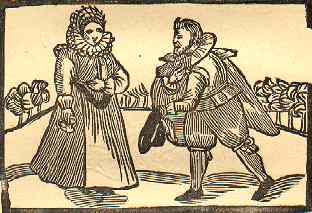The ideal courtier
A collection of anecdotes, debates, and advice: Castiglione's Libro del Cortegiano (1528) was translated into sprightly English in 1561. It celebrates the high Renaissance culture--love as religion--in the court of the tiny dukedom of Urbino in northern Italy. According to Roger Ascham, Castiglione combined learning and delight in an ideal way:
To join learning with comely exercises, Count Baldassare Castiglione, in his book Corteginano, doth trimly teach; which book advisedly read and diligently followed but one year at home in England, would do a young gentleman more good, I wiss than three years' travel abroad in Italy.
The cult of courtly love influenced poets, musicians, and artists. Sir Thomas Wyatt's poetry, for example, celebrates both the melancholy and joy of idealized, unattainable love. His "catch," or round "Ah Robin,"* set to music by his comtemporary William Cornyshe debates the nature of women's constancy. As Wyatt's poem suggests, courtly love could easily become courtly hate . . .*
Footnotes
-
English manners
Paul Hentzner travelled to England from his native Germany in 1598, recording his impressions. He includes a miscellaneous collection of comments on manners:
The English are serious like the Germans, lovers of show. . . They excel in dancing and music, for they are active and lively, though of a thicker make than the French; they cut their hair close on the middle of the head, letting it grow on either side; they are good sailors and better pirates, cunning, treacherous, and thievish. . . .
They give the wall as the place of honour [allow their superiors in social rank to walk closer to the wall (more protected from splashes of mud)]; hawking is the general sport of the gentry; they are more polite in eating than the French, devouring less bread, but more meat, which they roast in perfection; they put a great deal of sugar in their drink; their beds are covered with tapestry, even those of farmers; they are often molested with scurvy, said to have first crept into England with the Norman conquest.Scurvy
Scurvy is caused by a deficiency in vitamin C; ironically the nobility, with their refined manners, tended to eat refined and cooked foods, and were thus more vulnerable to scurvy than ordinary people.
-
Ah Robin
Ah Robin
Gentle Robin
Tell me how thy leman [loved one] doeth
And thou shalt know of mine.
My lady is unkind I wis!
Alack why is she so!
She loveth another better than me,
And yet she will say no.
(Refrain)
I cannot think such doubleness
For I find women true,
She hath ta'en my heart and left me well,
She will change for no new.
(Refrain)
Thou art happy while that doeth last,
But I say as I find,
That women's love is but a blast
And turneth with the wind.
(Refrain) -
Courtly hate
When fallible human beings are idealized, there will always be a problem when the reality of their imperfection becomes apparent. Thus the tendency of courtly love to see women as perfection may actually have contributed to the frequent misogyny of the period--they were not angels, so they must be devils.
